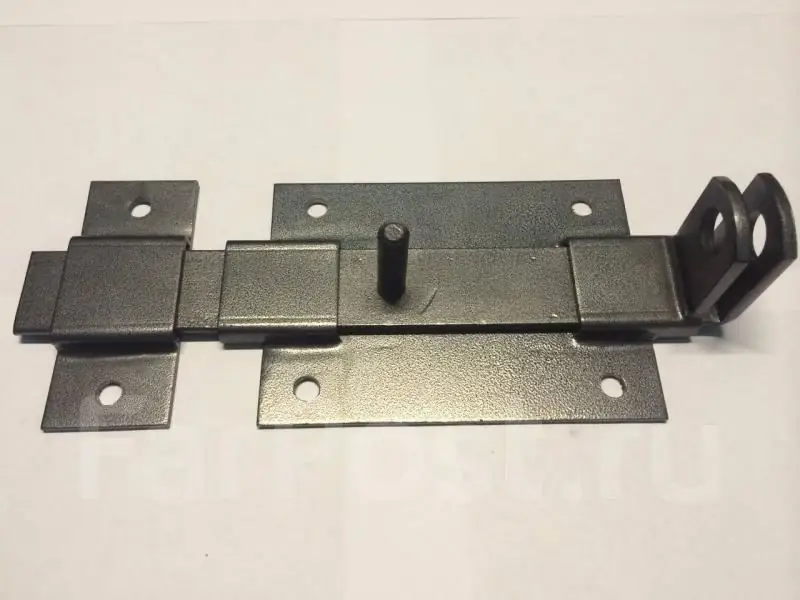
Table of contents:
- Author Bailey Albertson albertson@usefultipsdiy.com.
- Public 2023-12-17 12:53.
- Last modified 2025-06-01 07:32.
All about door latches

The latch is the oldest type of door lock, the prototype of all currently known locks. However, despite the far-reaching technological progress, the valve is still in great demand among consumers. The distinctive features of this mechanism are simplicity, reliability and unlimited service life. A correctly installed latch significantly increases the level of security at home, apartment, summer cottage.
Content
- 1 Purpose of the door latch
-
2 Types of door latches
- 2.1 By design type
- 2.2 By installation method
-
3 Installing door latches
- 3.1 Mounting the overhead bolt
- 3.2 Installing the mortise latch
- 4 Reviews
Purpose of the door latch
The main difference between the latch and an ordinary lock is the one-way opening method. The latch prevents penetration through the door while the owners are indoors. It is almost impossible to open it from the outside.
Structurally, the latch is a metal (or in rare cases wooden) rod (crossbar), which is set in motion by hand or by means of an electrical impulse. In the closed position, the latch fixes the canvas by engaging with the door frame. Since the frame is stationary and firmly embedded in the wall, it is very difficult to open the sash without breaking the pull-out tongue.

The door latch body is equipped with mounting holes
Traditionally, the valve is closed at night when all family members are at home. Therefore, the heck is often also referred to as a night catch.
Benefits of installing a door latch:
- strengthening the strength of the door, protection against burglary (the latch, in fact, is an additional lock that cannot be opened from the outside);
- less wear of the locks (performing the function of an "internal" lock, the valve noticeably extends the service life of the remaining locking devices, while it itself practically does not wear out);
- serves as a temporary replacement for locks during their removal, for example, for repair.
However, in some cases it is not recommended to install a night valve in residential premises:
- When an elderly person with a disability lives in the house (or a separate room). An unexpected exacerbation of the disease can lead to the fact that a person will not be able to independently unlock a door that is locked on the latch.
- The presence of minor children. While playing, the child can push the latch bolt, but he will not be able to open it on his own or will not want to.
- Pets, especially dogs and cats. When jumping on a door, a pet may accidentally hook the bolt lever and close the door. Naturally, they will not be able to do the opposite.
If, nevertheless, the valve is necessary, experts recommend installing electronic mechanisms. In them, the movement of the locking bolt is carried out using a remote control key fob.
Types of door latches
When choosing a door latch, factors such as:
- door construction;
- decorative design;
- door leaf and frame material.
An incorrectly selected type of latch over time leads to a distortion of the door leaf and a loose fit of the sash to the frame. Therefore, before purchasing a mechanism, it is advisable to familiarize yourself with the manufacturer's recommendations.
By construction type
On this basis, the following classification of door valves has been adopted:
-
With swivel arm (or wing). The deadbolt is driven by turning (or rotating) the lever. The force is transmitted through a gear or worm gear. The gate valve is very easy to operate, with proper installation and timely lubrication it lasts for an unlimited time.

Butterfly valve The butterfly valve is controlled by rotation
-
For swing doors. The latch serves to fix one or two leaves. It can be installed both in the horizontal and in the vertical plane of the door. Often used in one-and-a-half doors as a retainer for the smaller wing of a door unit.

Swing door latch The wing door wings are fixed with special latches located vertically
-
Bolt gate valves. They are used both in the residential and industrial sectors. For the manufacture of used durable, wear-resistant materials - aluminum, stainless steel, steel. This is the simplest type of latch, control is carried out by moving the crossbar along the canvas until it stops in the counterpart on the frame.

Door bolt Door bolt - classic type of bolt
-
Electronic radio controlled door latches. The crossbar is driven by an electric motor. This type can be either an independent mechanism or an addition to an electromechanical lock. On sale there are electric latches with autonomous or mains supply. The set includes a keychain with a source of electromagnetic waves of a certain frequency.

Electronic radio controlled door latches The electronic latch can be with one or more retractable bolts
By installation method
In addition, door latches are divided into two classes according to the installation method:
-
waybills;

Overhead gate valve Surface mounted latch is mounted on top of the door leaf
-
mortise.

Mortise valve The mortise valve is mounted inside the sash
As the name implies, the former are mounted on the surface of the door leaf (using bolts, self-tapping screws or welding), the latter are cut into the sash. For entrance metal doors, it is preferable to use mortise latches with a pivot mechanism. Such a device reliably protects the door from mechanical burglary and is capable of withstanding a load of up to 2.5 tons. Paneled wooden doors, as well as doors made of chipboard, plywood, are best equipped with overhead latches. This is due to the fact that cutting into the canvas leads to a weakening of its rigidity.
Installation of door valves
To install the door valve yourself, you will need the following tools and materials:
- screwdrivers or screwdriver;
-
electric drill;

Electric drill Using a drill, the holes are drilled, which are necessary for installing the door latch.
- construction tape;
- pencil;
-
hydraulic level.

Hydraulic level A short hydraulic level will help align the valve to a horizontal position
Installation of the overhead bolt
Installation includes several stages:
- Markup. On the door leaf, the optimal location for the mechanism is selected. As a rule, the valve is placed 80-100 cm above the floor. With the help of a level, a horizontal line is drawn, along which the latch body is subsequently attached.
- Fixing the valve to the canvas. To do this, use wood screws (with a wide threading pitch). With a screwdriver or screwdriver, the body is attached to the surface of the door leaf.
-
Fastening the counterpart to the door frame. The seat must be exactly in the valve axis. A misalignment will lead to jamming of the deadbolt, which is unacceptable.

Installation of a latch on the door The counterpart must be located strictly along the axis of the valve
Installation of a mortise latch
In the case of a mortise valve:
- The markup is carried out as in the first case.
-
A hole is drilled at the end of the door leaf. The diameter is selected based on the size of the crossbar - it must move freely inside the channel.

The location of the latch on the door When installing a butterfly valve, a hole is drilled at the end of the blade
- On the inner surface of the blade, the location of the drive wing is determined. A hole of the required size is drilled.
-
The latch body and the turntable are installed in the seat. On wooden doors, a piece of wood is selected from the end so that the body is in the same plane with the door surface.

Installation of a mortise gate valve in a wooden door In the case of a wooden door, a piece of wood must be selected from the end
- A hole is drilled in the frame along the diameter of the crossbar (with a gap of 1-1.5 mm). The depth is determined by the length of the bolt protrusion (plus 2-3 mm).
-
In the event that the door frame is made of wood, a striker is mounted on it. It is fixed with self-tapping screws over the bolt hole. If the gap between the door leaf and the frame is small (less than 3 mm), the strip is recessed into the frame, deepening into the wood by a few millimeters.

Installing a strike plate on the door Preparing a place for installing a striking plate is done using a template
Metal doors are equipped with both overhead and mortise latches. There may be several options. The cover plate can be fastened to the bolts pre-welded to the door or directly by welding. The insert of the gate valve is made in a manner similar to that described above for wooden doors.

A radio-controlled latch can block the door leaf in the most unexpected places for a burglar
Reviews
If the installation of a door latch seems difficult or the necessary tools are missing, you can always turn to specialists for help. This primarily concerns radio-controlled constipation. Locksmiths will help you choose the right size of the latch and professionally install the mechanism on the door.
Recommended:
Platbands On The Door: Varieties With A Description And Characteristics, Pros And Cons, And How To Install Correctly
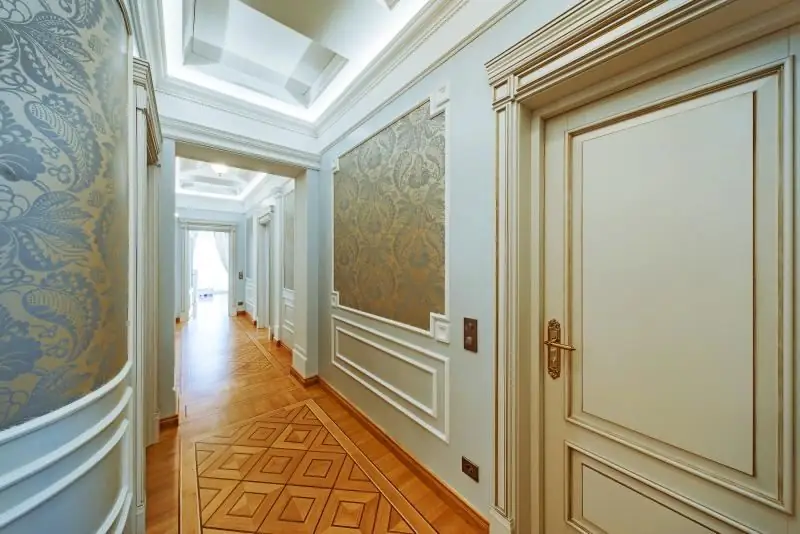
Why do we need door trims and how they can be beaten in the interior. How to do it yourself from wood, plywood and plaster. We study materials and make a choice
Door Opening Limiter: Varieties With Description And Characteristics, Pros And Cons, And How To Install Correctly
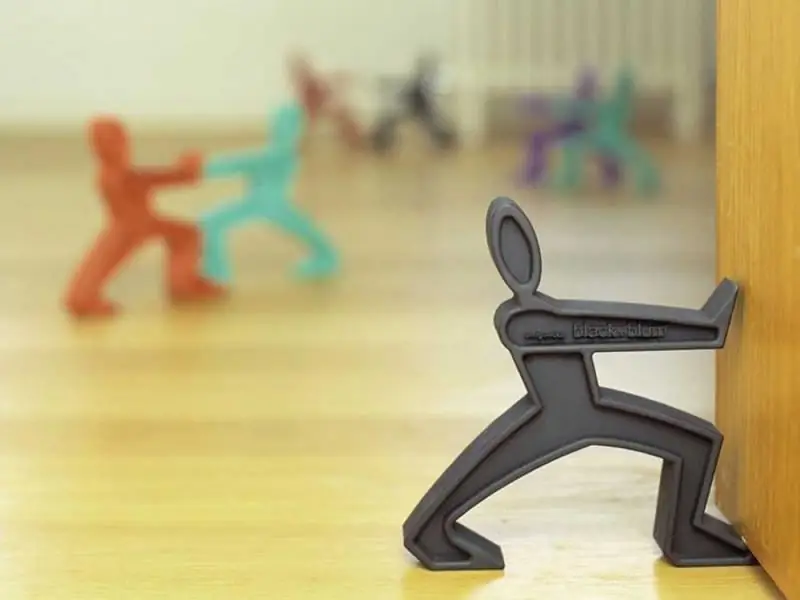
A variety of door stops, their differences in type of construction and installation method. DIY installation and repair of door stops
Door Latch: Varieties With A Description And Characteristics, Pros And Cons, As Well As How To Properly Install On The Door
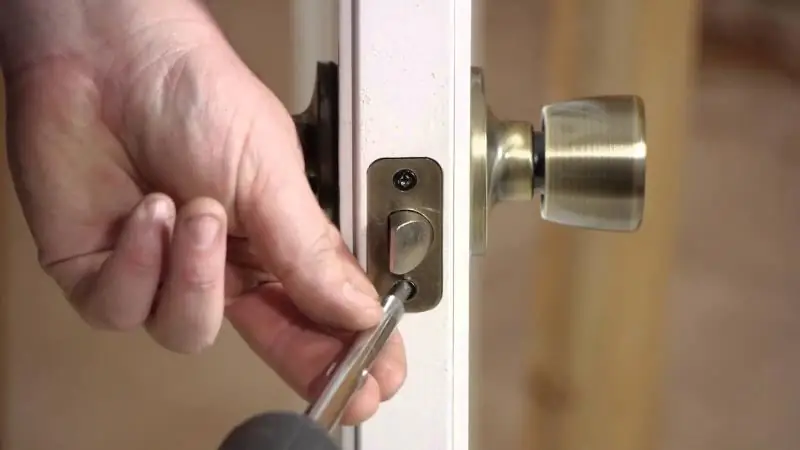
Purpose of the door latch. Types of door latches, features of their device, advantages and disadvantages. The process of mounting and dismantling the door latch
Front Door Trim: Varieties With Description And Characteristics, Pros And Cons, And How To Install Correctly
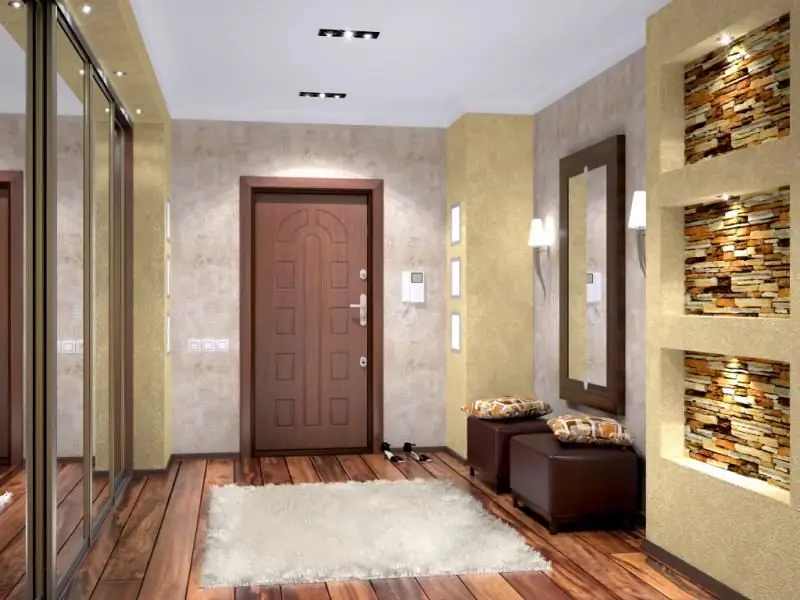
Appointment of overlays on the front door. Their description, features, advantages and disadvantages. Do-it-yourself technology for installing linings on front doors
Toilet Roller Shutters: Varieties And Material, Pros And Cons, As Well As How To Properly Install And Operate
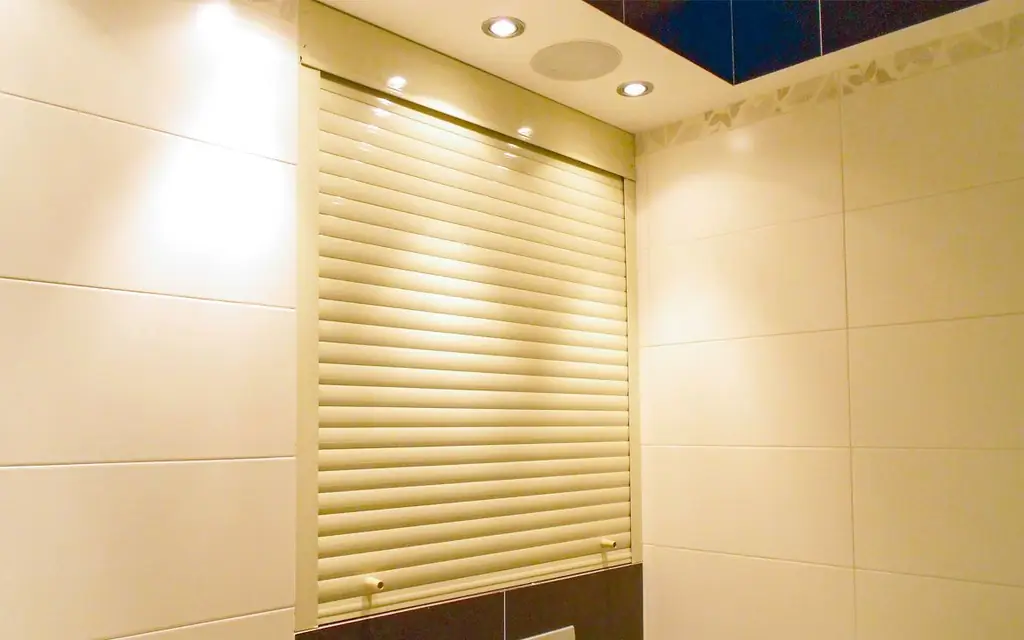
Appointment of roller shutters in the toilet. Types and dimensions of roller shutters. Assembly and installation process. Features of repair and operation of roller shutters
